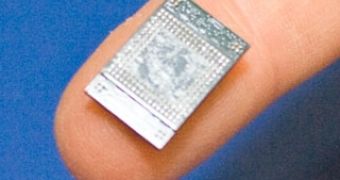Solid-state drives are becoming more and more appealing as their price keeps on falling. A whole bunch of companies are fueling the market with their own models, usually ranging from the common 32GB size to Bitmicro's 832 GB monster-like solid state drive. Of course, there are some hard-drives manufacturers who have completely dropped their miniature HDD businesses, while others won't just let go.
Intel is one of the youngest players in the solid-state drives industry, but at the same time, it has taken a completely different approach. While the other manufacturers are struggling to produce devices that can be added or removed from the system at will, the chip manufacturer is offering fingertip-sized solid-state drives that can be welded directly to the host printed circuit board (PCB).
Don Larson, Intel's Product Line Manager of the NAND Products Group has unveiled the new line of miniature solid-state drives at this year's Consumer Electronics Show. Funny thing, when it came to the live presentation, Larson pulled out some thin chips from his pockets, while mentioning that those were the SSDs containing both a PATA/IDE controller and 2 to 4 GB of flash memory
The most interesting chip in the miniature SSD series is the Z-P140 SSD we have told you about earlier. It cannot be inserted or removed from the system, but, instead, it will be soldered onto the motherboards of small laptops and ultra-mobile computers. The integrated controller can manage up to four such flash drives for a total 16 GB of on-board flash memory.
The drives are to go along with Intel's future Menlow platform, targeted at mobile Internet devices and ultra-mobile computers. Moreover, Intel also showcased a prototype version of the Classmate PC to use similar solid state drive technology. Although the Z-P140s are recommended to be used within cell phones or sub-notebooks, the laptop users might pick a wider storage option.
Some other interesting device Larson showed was a palm-sized drive that is alleged to reach 10 to 100 times the performance of nowadays hard drives. It is for sure that it will feature a standard SATA interface, but the rest of the unit's specifications set is yet to come.

 14 DAY TRIAL //
14 DAY TRIAL //